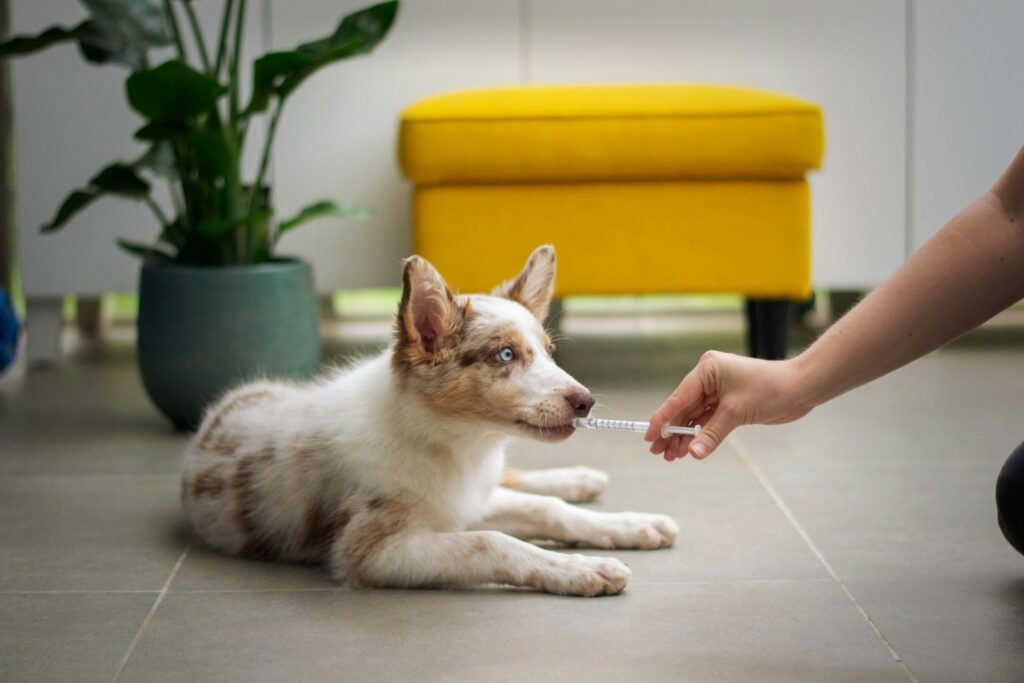Introduction
Understanding the Canine Digestive System
When you think about it, your dog’s digestive system is quite remarkable, working tirelessly around the clock to break down food and absorb nutrients. Just like us, our furry companions rely on their gut for energy and health, making it essential to understand how it operates.
The canine digestive system is designed to process different types of foods, primarily meat, but it also requires fibre for optimal gut health. Here’s a quick breakdown of how it works:
- Mouth : Dogs begin their digestion by chewing their food, mixing it with saliva to help breakdown nutrients.
- Stomach : This is where the largest part of the digestion process occurs. It produces strong acids to digest proteins and kill harmful bacteria.
- Small Intestine : Here, the food is further broken down, and crucial nutrients are absorbed into the bloodstream.
- Large Intestine : This organ plays a vital role in absorbing water and electrolytes while forming solid waste.
Understanding this anatomy helps us appreciate the complex nature of dog gut problems or dog digestive problems. In my experience, noticing subtle changes in your pet’s eating habits or bathroom routine can be key indicators of potential issues. For example, when my Labrador, Max, started turning his nose up at his food and had sporadic energy levels, it raised red flags. What I later discovered was a minor digestive upset, but it could have escalated into more serious dog gut issues if left unchecked.
By keeping an eye on your pup and knowing how their digestion should function, you can catch early signs of dog gut problems before they become more serious. Let’s delve deeper into some common digestive problems in dogs that you should be aware of.
Common Digestive Problems in Dogs
Diarrhoea and Vomiting
When it comes to dog digestive problems, diarrhoea and vomiting are at the top of the list. As pet owners, seeing your furry friend in discomfort can be distressing. It’s important to know that these symptoms can stem from various causes, like dietary changes, food intolerance, or infections.
For instance, when I introduced a new brand of dog food to my Golden Retriever, Bella, she immediately developed diarrhoea. I realized she had a sensitive stomach that couldn’t handle the abrupt change. A few days of bland food (think boiled chicken and rice) and she was back to her cheerful self. Here are some common triggers for diarrhea and vomiting in dogs:
- Sudden diet changes
- Eating too fast
- Consuming spoiled food or trash
- Allergies or intolerances
If your dog is experiencing these symptoms, monitoring their hydration is crucial. Dehydration can quickly become a significant concern, so ensure they have access to fresh water.
Constipation and Upset Stomach
On the flip side, constipation can be just as concerning. It’s often characterized by infrequent or difficult bowel movements, and your dog may seem uncomfortable or painful. Some potential causes include:
- Lack of fiber in their diet
- Insufficient water intake
- Lack of exercise
When my Beagle, Charlie, started straining during his walks, I knew something was off. A little extra fiber through pumpkin puree did wonders for him!
Similarly, an upset stomach can manifest through symptoms like excessive drooling, whining, or restless behavior. Both constipation and an upset tummy can indicate dog gut issues that need your attention. Being observant of your dog’s bathroom habits and overall demeanour can help you catch problems early and seek a vet’s guidance when necessary. Let’s take a closer look at the causes behind these dog digestive issues.
Causes of Digestive Issues in Dogs
Dietary Factors
As we explore the causes of dog digestive problems, one of the most significant factors is diet. A dog’s digestive system is sensitive, and even minor adjustments can trigger issues. Poor diet choices or sudden changes can leave your pup feeling unwell. Here are some key dietary factors that could lead to digestive issues:
- Inadequate Fiber : Dogs need fiber for healthy digestion. A lack of it can result in constipation or upset stomach.
- Sudden Food Changes : Transitioning too quickly to a new food brand or flavor can confuse their digestive system.
- Low-Quality Ingredients : Some dog foods contain fillers and artificial ingredients that can upset your dog’s belly.
- Human Food : It might be tempting to share your meals, but many human foods are harmful to dogs, leading to serious digestive problems.
I remember when I gave Bella some leftover pizza crust – it didn’t end well!
Stress and Anxiety
Another often-overlooked cause of digestive problems in dogs is stress and anxiety. Just like us, dogs can experience digestive disturbances due to emotional factors. Factors that may induce stress in dogs include:
- Changes in Environment : A move to a new home or a new pet in the family can unsettle your dog.
- Loud Noises : Thunderstorms, fireworks, or construction noises can cause anxiety.
- Separation Anxiety : Many dogs become anxious when left alone, which can lead to digestive issues.
When I adopted Charlie, he struggled with separation anxiety. I noticed he often vomited when I left for work. Consistent routines and gradual desensitization helped him adjust.
Understanding these causes can help you mitigate issues before they escalate. Next, we will discuss the signs and symptoms of digestive problems, helping you spot them early on.
Signs and Symptoms of Digestive Problems
Loss of Appetite
Recognizing the signs and symptoms of digestive problems in dogs is crucial for early intervention, especially when it comes to something as telling as a loss of appetite. If your normally eager eater turns their nose up at mealtime, it can be a significant indicator that something is not right.
Loss of appetite can stem from various digestive issues or even underlying health problems. Here are some potential causes to keep in mind:
- Gastrointestinal Upset : This could be due to dietary indiscretion, such as snacking on trash.
- Pain or Discomfort : Issues like bloating or constipation can make eating painful.
- Stress or Anxiety : As we discussed earlier, emotional factors can heavily impact your dog’s desire to eat.
When my dog Bella suddenly refused to eat her favourite kibble, I knew that wasn’t typical behaviour. After a vet visit, we discovered it was a temporary stomach upset. Paying attention to changes in your dog’s eating habits can be a crucial first step in diagnosing digestive problems.
Weight Loss and Lethargy
Another alarming symptom to watch for is unexplained weight loss and lethargy. If your furry friend seems unusually tired and is shedding pounds, it may be another sign of digestive distress.
Several factors can contribute to these symptoms:
- Malabsorption : If the digestive system isn’t properly absorbing nutrients, weight loss can occur despite normal eating habits.
- Chronic Conditions : Problems like pancreatitis, liver disease, or even certain cancers can lead to fatigue and weight changes.
- Dehydration : Ongoing diarrhea or vomiting can rapidly lead to weight loss and energy depletion.
I remember the heartbreaking moment when Charlie lost weight and seemed less playful than usual. It turned out to be a simple dietary adjustment, but it was a wake-up call to monitor his health more closely.
By keeping an eye on these signs, you can more effectively communicate with your veterinarian and ensure your furry friend gets the care they need. Next, let’s explore how to diagnose these digestive disorders in dogs.
Diagnosing Digestive Disorders in Dogs
Veterinary Examinations
When you notice signs of digestive problems in your dog, seeking help from a veterinarian is crucial. The first step in diagnosing dog gut issues typically involves a thorough veterinary examination. This hands-on assessment is your vet’s opportunity to get a clear picture of your pup’s overall health.
During the examination, they will:
- Check Vital Signs : Your vet will take note of your dog’s heart rate, temperature, and hydration levels.
- Palpate the Abdomen : Feeling for lumps, pain, or swelling can give clues about underlying issues.
- Discuss Symptoms : Sharing details about changes in appetite, behavior, or stool can help narrow down potential causes.
I remember taking Bella to the vet when she seemed lethargic and off her food. The examination revealed some soreness in her abdomen, which warranted further investigation.
Laboratory Tests and Imaging
If your vet suspects more serious issues, they may recommend laboratory tests and imaging. These diagnostic tools help uncover the root causes of your dog’s digestive troubles.
Common tests include:
- Blood Tests : These check for infections, organ function, and overall health markers.
- Fecal Exam : Analyzing stool can help identify parasites, bacteria, or digestive imbalances.
- X-rays or Ultrasounds : Imaging can reveal blockages, tumors, or abnormalities in the gastrointestinal tract.
When we pursued additional tests for Charlie due to his persistent gastrointestinal upset, the results helped pinpoint a gastrointestinal infection. This swift action allowed us to begin the appropriate treatment right away.
By understanding the diagnostic process, you can feel more equipped and informed during your veterinary visit. Being proactive about your dog’s digestive health is key to ensuring they lead a happy and active life. Next, we’ll look into the available treatment options for dog digestive problems.
Treatment Options for Canine Digestive Problems
Medications and Prescription Diets
Once your veterinarian diagnoses the underlying cause of your dog’s digestive issues, they may recommend specific treatment options to address the problem effectively. One common approach is through medications and prescription diets designed for canine gut health.
Medications can vary based on the diagnosed issue and may include:
- Antibiotics : These are used to tackle bacterial infections.
- Probiotics : Supplements that promote healthy gut bacteria can restore balance, especially after a round of antibiotics.
- Anti-nausea Medications : If your dog is experiencing vomiting, these can help alleviate discomfort.
Additionally, your vet may prescribe a specialized diet aimed at promoting digestive health. For instance, my Golden Retriever, Bella, was on a prescription diet following a bout of gastrointestinal upset. The vet suggested a diet rich in digestible ingredients, which made a noticeable difference in her recovery.
Natural Remedies and Supplements
In addition to medical interventions, many dog owners turn to natural remedies and dietary supplements to support digestive health. While always consult with your veterinarian before introducing any new treatments, here are some popular options:
- Pumpkin : Rich in fiber, pumpkin can help regulate your dog’s bowel movements and is easy to mix in with their regular food.
- Digestive Enzymes : These help break down food more effectively and can ease digestive discomfort.
- Herbal Remedies : Certain herbs, like ginger, can soothe upset stomachs.
When Charlie faced digestive troubles, I often included a spoonful of pumpkin in his food. It worked wonders for his digestion and allowed him to maintain a regular schedule.
Exploring a combination of these treatments can lead to a healthier and happier pup. As we continue, we’ll discuss preventive measures for digesting issues, ensuring your dog stays in the best shape possible.
Preventing Digestive Issues in Dogs
Proper Nutrition and Feeding Schedule
Prevention is always better than cure, especially when it comes to your dog’s digestive health. One of the most effective ways to prevent dog digestive problems is by focusing on proper nutrition and maintaining a consistent feeding schedule.
Here are some key tips for ensuring your pup’s diet supports a healthy gut:
- Quality Food : Choose high-quality dog food with wholesome ingredients. Look for brands that list real meat and whole grains as the primary components.
- Gradual Changes : If you decide to switch your dog’s food, do so gradually over a week to avoid upsetting their stomach.
- Consistent Portions : Feeding your dog at the same times each day helps regulate their digestive process.
For example, Bella thrives on a routine; when I keep her meals at regular intervals, her digestion remains stable.
Regular Exercise and Stress Management
In conjunction with a solid nutritional plan, regular exercise and stress management play a vital role in preventing digestive issues. Physical activity helps boost metabolism and encourages healthy bowel movements. Aim for at least a 30-minute walk or play session every day. Invest in good quality dog toys to get some exercise on rainy days.
On top of physical activity, managing stress is equally crucial. Dogs can experience anxiety just like humans, impacting their digestive health. Here are some tips to help alleviate stress:
- Create a Safe Space : A designated area for your dog to feel secure can help reduce anxiety.
- Mental Stimulation : Engaging your dog in puzzle toys or training exercises can keep their minds occupied and minimize stress.
- Routine : Dogs love routine! Maintaining a predictable schedule can help reduce anxiety levels.
When I first adopted Charlie, he was quite anxious. With regular walks and plenty of interactive playtime, he soon became more at ease, which positively affected his digestion as well.
By addressing nutrition, exercise, and anxiety, you’ll create a solid foundation for your dog’s health. Now, let’s discuss when to consult a veterinarian for your canine companion’s digestive issues.
When to Consult a Veterinarian
Persistent Digestive Symptoms
Despite our best efforts to provide proper nutrition and a healthy lifestyle, our beloved dogs may still experience digestive problems. Knowing when to consult a veterinarian is crucial to ensuring their health and well-being. If you notice persistent digestive symptoms, it’s time to seek professional help.
Here are some signs that warrant a visit to the vet:
- Continued Vomiting or Diarrhea : If these symptoms last more than 24 hours, dehydration can become a serious issue.
- Loss of Appetite : A sudden and extended loss of interest in food may indicate a more serious problem.
- Abdominal Pain or Discomfort : If your dog shows signs of pain when you touch their belly or seems unusually restless, don’t hesitate to reach out to your vet.
For example, when Bella had a bout of diarrhea that lasted over two days, I knew I couldn’t wait any longer. A quick vet visit revealed an infection that needed treatment, which made all the difference in her recovery.
Severe or Chronic Conditions
Additionally, if your dog is experiencing severe or chronic digestive issues, immediate veterinary attention is necessary. Conditions such as pancreatitis, inflammatory bowel disease (IBD), or even tumors can significantly impact your dog’s health if left untreated.
Keep an eye out for the following:
- Persistent Weight Loss : If your dog consistently loses weight despite regular feeding, this is a cause for concern.
- Bloating : A bloated abdomen can indicate serious issues, including gas buildup or torsion.
- Lethargy : If your dog is acting particularly sluggish or indifferent to activities they usually enjoy, it’s time to consult a veterinarian.
Charlie once showed signs of lethargy coupled with vomiting for over a week. After examining him, the vet identified chronic gastritis, and we worked together to manage it effectively.
Recognizing these concerning signs and symptoms is vital in maintaining your dog’s digestive health. By being proactive and consulting a veterinarian when necessary, you can help your furry friend lead a longer, healthier life.





